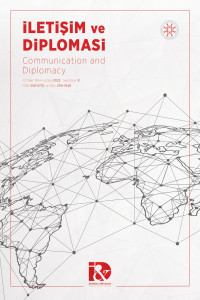Abstract
11 Eylül 2001’de meydana gelen terörist saldırılar, Birleşik Devletlerin ulusal güvenliğini derinden etkileyen, dünyanın siyasi manzarasını değiştiren ve terörün Birleşik Devletler güvenlik politikasının merkezinde yer almasını sağlayan olaylardır. 11 Eylül sonrası Başkan George W. Bush’un Teröre Karşı Savaş’ı ilan etmesi, küresel siyasi ilişkilerde dünyanın gidişatını değiştiren bir yaklaşımdır. Çok boyutlu bir eylem olan Teröre Karşı Savaş, ulusal güvenlik için kavramsal bir çerçeve şeklini almış ve iş birliğinin genişletilmesi ekseninde küresel bir koalisyon kurma ve koalisyonu sürdürme çabası olmuştur. Söylemsel tepkilerin gerektirdiği güdülerde Teröre Karşı Savaş, fikirlerin şekil alması ve kitlelerce anlaşılabilmesi açısından bir sebep-sonuç ilişkisi ortaya çıkarmış ve uluslararası politikaları meşrulaştıran bir basamak olarak nitelendirilmiştir. Birleşik Devletlerin güvenlik çıkarlarına dair kamu diplomasisinde Teröre Karşı Savaş Amerikan karşıtlığına karşı kapsamlı bir kamu diplomasisi kampanyası halini almıştır. Bu bağlamda Teröre Karşı Savaş, Bush yönetimi kamu diplomasisinin retorik bir temelidir. Bush yönetiminde Birleşik Devletler açısından ülke değerleri için bir hatırlatma eylemi olan ve kendilerini düşmanlarından ayırmaya yarayan Teröre Karşı Savaş ülkede birliğin ve kuvvetin oluşturulmasına yönelik ehemmiyet kazanmıştır. Bu çalışmada, 11 Eylül saldırılarının kamu diplomasisine yansıması, Teröre Karşı Savaş stratejisi ve Bush Doktrini ele alınmaktadır. Aynı zamanda kitlelerin değer yargılarının biçimlenmesinde ve politikaların uygulanmasında Teröre Karşı Savaş retoriği kamu diplomasisi anlayışından hareketle irdelenmektedir.
References
- Referans1 Kissinger, H. (2012). Diplomasi (İ. H. Kurt, Çev.). İstanbul: Türkiye İş Bankası Yayınları.
- Referans2 Lynch, T. J. & Singh, R. S. (2008). After Bush: The Case for Continuity In American Foreign Policy. New York: Cambridge University Press.
- Referans3 Melissen, J. (2005). The New Public Diplomacy: Between Theory and Practice, In J. Melissen (Ed.), The New Public Diplomacy Soft Power in International Relations (pp.3-27). New York: Palgrave MacMillan.
Abstract
The terrorist attacks that occurred on September 11, 2001 are events that profoundly affected the national security of the United States, changed the political landscape of the world, and put terrorism on the primary agenda of United States security policy. President George W. Bush’s declaration of the War on Terror after 9/11 is an approach that changed the course of the world in global political relations. The War on Terror, a multidimensional action, took the form of a conceptual framework for national security and was an effort to establish and maintain a global coalition on the axis of expanding cooperation. In the motives required by the discursive reactions, the War on Terror has revealed a cause-effect relationship in terms of shaping the ideas and being understood by the masses, and has been described as a step that legitimizes international policies. In public diplomacy regarding the security interests of the United States, the War on Terror has become a comprehensive public diplomacy campaign against anti-Americanism. In this context, the War on Terror is a rhetorical basis for Bush administration public diplomacy. During the Bush administration, the War on Terror, which was an act of reminder for the values of the country and used to distinguish themselves from their enemies, gained importance for the creation of unity and strength across the country. In this study, the reflection of the 9/11 attacks on public diplomacy, the War on Terror strategy and the Bush Doctrine are addressed. At the same time, the rhetoric of the War on Terror in the formation of the value judgments of the masses and the implementation of the policies is examined from the perspective of public diplomacy.
References
- Referans1 Kissinger, H. (2012). Diplomasi (İ. H. Kurt, Çev.). İstanbul: Türkiye İş Bankası Yayınları.
- Referans2 Lynch, T. J. & Singh, R. S. (2008). After Bush: The Case for Continuity In American Foreign Policy. New York: Cambridge University Press.
- Referans3 Melissen, J. (2005). The New Public Diplomacy: Between Theory and Practice, In J. Melissen (Ed.), The New Public Diplomacy Soft Power in International Relations (pp.3-27). New York: Palgrave MacMillan.
Details
| Primary Language | English |
|---|---|
| Subjects | International Relations |
| Journal Section | Research Articles |
| Authors | |
| Publication Date | July 26, 2022 |
| Submission Date | April 6, 2022 |
| Published in Issue | Year 2022 Issue: 8 |
 Bu eser Creative Commons Atıf-GayriTicari 4.0 Uluslararası Lisansı ile lisanslanmıştır.
Bu eser Creative Commons Atıf-GayriTicari 4.0 Uluslararası Lisansı ile lisanslanmıştır.


